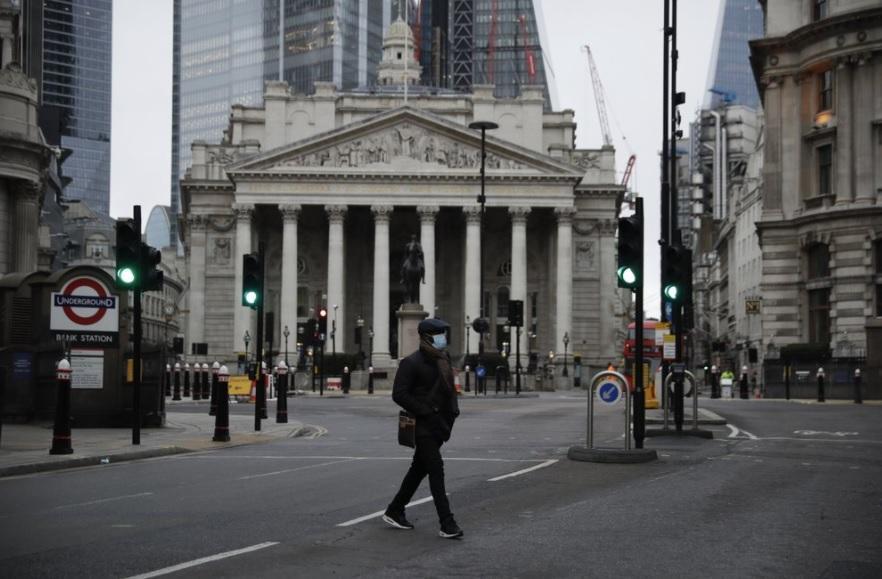
England began to further ease its coronavirus lockdown on March 29, spurred by rapid vaccinations, but governments in the rest of Europe struggled to contain COVID-19 surges.
Dramatic infection spikes in Europe have forced a tightening of unpopular restrictions across the continent, with Washington’s top pandemic expert warning the United States could suffer a similar surge if curbs are eased too quickly.
In sharp contrast, people in England were set for what newspapers dubbed "Happy Monday", with stay-at-home orders relaxed to allow outdoor gatherings of up to six people and the resumption of amateur sports.
"But we must remain cautious, with cases rising across Europe and new variants threatening our vaccine rollout," Prime Minister Boris Johnson said, conceding that the European wave could hit Britain.
On March 28, Britain passed the milestone of giving the first vaccine dose to more than 30 million adults, and the government plans to allow outdoor drinking in pub gardens and non-essential retail such as hairdressers in England from April 12.
The other nations in the United Kingdom - Scotland, Wales and Northern Ireland - are following their own schedules.
The mood was grim across the English Channel, however.
A snowballing of cases in France intensified pressure on health infrastructure, and top officials warned on March 28 that Paris hospitals may be forced to turn patients away.
"In 10 days, 15 days or three weeks we may be overwhelmed," senior Paris hospitals official Remi Salomon told BFMTV, pleading for a new lockdown - including for schools.
And in Germany, Chancellor Angela Merkel on March 28 pleaded with state governments to stop straying from agreed pandemic measures, with her government under pressure over a sluggish vaccine rollout and testing delays.
Germany’s disease control agency has warned of an "exponential" growth in cases.
Belgium has also tightened restrictions - all schools and universities will be closed from March 29, effectively extending the Easter holiday to three weeks.
The pandemic has claimed more than 2.7 million lives globally.
Europe’s latest wave of infections came after outbreaks were largely brought under control and as nations prepared for mass vaccine rollouts.
Top U.S. pandemic advisor Anthony Fauci said the trend served as a warning to the United States.
The world’s worst-hit nation has recently ramped up its vaccination drive, giving on average more than two million shots daily last week.
But Fauci said some U.S. states were easing curbs too prematurely.
When case numbers begin to plateau, he explained on CBS, "you’re really in danger of a surge coming up."
"We’ve seen that in our own country, and that’s exactly what’s happened in Europe... where they plateaued and then started to come back."
Despite their struggles, wealthy nations such as the United States have managed to give out the bulk of shots worldwide, and the United Nations Secretary-General criticised them for stockpiling vaccines beyond the needs of their populations.
"I’m very concerned with this very unfair distribution of vaccines in the world," Antonio Guterres said in an interview broadcast on March 28 by the Canadian channel CBC.
Impoverished Venezuela on March 28 offered "oil for vaccines", as the sanctions-hit nation faced a second wave of infections.
Even with vaccine rollouts gathering pace, governments are still using varying degrees of lockdowns to counter outbreaks - including in countries where the virus has been largely brought under control.
More than two million people in Brisbane - Australia’s third-biggest city - were ordered into a snap three-day lockdown on March 29 after seven people tested positive.
The persistent threat has meant large gatherings - concerts, religious services and sports events - have had to be held either without fans or not at all.
But a trial concert in Barcelona on the weekend attempted to demonstrate a safe way to organise mass events again, with 5,000 people dancing ecstatically to live music.
Everyone wore masks, and underwent screening and rapid, 10-minute coronavirus tests before the gig.
"It’s incredible, so exciting," said Jordi Sanz.
"We’d forgotten what it was like to be around other people, it’s as if it was my first-ever gig."